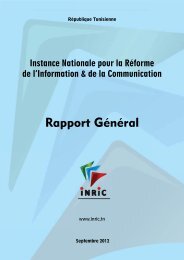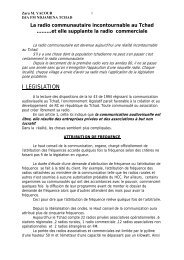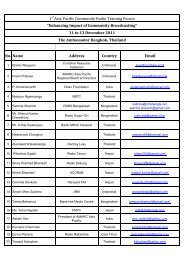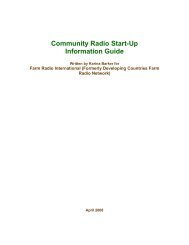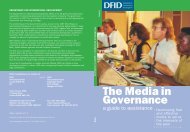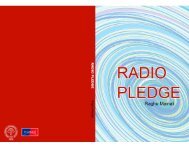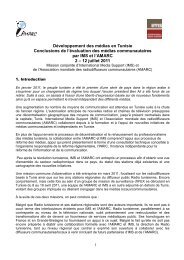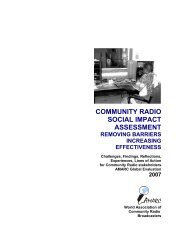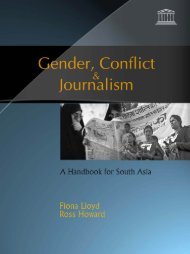Women's Empowerment and Good Governance Through - amarc
Women's Empowerment and Good Governance Through - amarc
Women's Empowerment and Good Governance Through - amarc
Create successful ePaper yourself
Turn your PDF publications into a flip-book with our unique Google optimized e-Paper software.
69<br />
Best Experiences for an Action Research Process<br />
information, about the things that touch them the most. The result is that those who can neither<br />
express their basic concerns nor have access to the kind of information, turn to radio<br />
broadcasts from neighbouring countries in the hope of learning, as they will note with irony,<br />
what is happening in their own country. They are at the same time looking for socio-cultural<br />
<strong>and</strong> even political enrichment, <strong>and</strong> to compare, the information broadcast elsewhere with<br />
what is offered to them at home. If answers to people’s questions are not to be found locally,<br />
obviously citizens will tune in elsewhere. It is worth remembering that the advantage of radio,<br />
whether it is national, local or community-based, is that one does not need to go anywhere.<br />
Newspapers,need to be distributed regularly they have to respond to citizen concerns, which<br />
is far from being the case. Radio is practical because almost everyone has one at home <strong>and</strong><br />
people have only to stretch out their arm to turn it on.<br />
Just like it is the case for the three national networks, a public service, local radio stations suffer<br />
from a lack of autonomy, which raises the essential question of freedom of expression.<br />
Subjected to extreme censorship <strong>and</strong> deprived of financial autonomy, these radio stations are<br />
reduced to broadcasting entertainment programs (50 per cent), socio-educational programs<br />
(30 per cent), <strong>and</strong> centrally prepackaged news (20 per cent). Only one hour a week is given<br />
over to the associative movement.<br />
The government has indeed stated this clearly. There is no question for now of freeing up<br />
the airwaves. If one is to believe statements made by the institutions in charge of it, such as<br />
the Ministry of Communications <strong>and</strong> the Interior Ministry, the audiovisual sector is <strong>and</strong> will<br />
continue to be the exclusive property of the State. Of a state, in other words, that values its<br />
own preservation over <strong>and</strong> above its concern for the wellbeing of its citizens in terms of news<br />
delivery, freedom or a more open society. The impertinence displayed on a daily basis by a<br />
written press which has been independent for 15 years now <strong>and</strong> which is highly critical of the<br />
government has taught the authorities their lesson, <strong>and</strong> they are anxious to avoid repeating<br />
this experience with the audiovisual sector. The impact of the broadcast media, such as television<br />
<strong>and</strong> radio, is considered even more dangerous because of reaching a greater number of<br />
people.<br />
A survey which our association “Women in Communication” carried out of eight local radio stations,<br />
is interesting because of their geographical location <strong>and</strong> linguistic, cultural <strong>and</strong> economic



